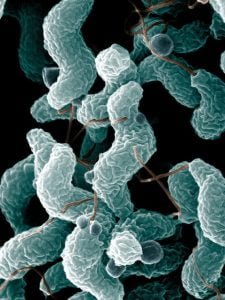
Campylobacter: Introduction, Classification, Morphology, Pathogenesis, Laboratory Diagnosis
Explore Campylobacter, its history, classification, morphology, pathogenesis, and laboratory diagnosis in this comprehensive guide. Read more
Your Trusted Student Notes
Bacteriology is a fascinating field of study that focuses on the biology, structure, and function of bacteria. It has played a crucial role in our understanding of microbial life and its impact on human health, agriculture, and the environment. In this category, we’ll explore some of the key aspects of bacteriology and topics of bacteriology.
One of the fundamental areas of bacteriology is the classification and identification of bacteria. Bacteria are incredibly diverse, and scientists have developed several systems to categorize and name them. One of the most widely used methods is based on the bacteria’s genetic sequence. This technique, called DNA sequencing, allows researchers to identify and classify bacteria with incredible accuracy. It has revolutionized our ability to study microbial communities and to understand their role in various ecosystems.
Another critical aspect of bacteriology is the study of bacterial structure and function. Bacteria are unicellular organisms that have a range of shapes and sizes. Some are rod-shaped, while others are spherical or spiral. They also have a range of structures, including flagella, pili, and capsules, which play essential roles in their movement, attachment, and virulence.
Understanding the structure and function of bacteria is crucial for developing effective treatments for bacterial infections. Antibiotics are one of the most common treatments for bacterial infections. They work by targeting specific aspects of bacterial structure or function, such as cell wall synthesis or protein synthesis. However, the overuse and misuse of antibiotics have led to the emergence of antibiotic-resistant bacteria, which pose a significant threat to global public health.
Bacteriology also plays a crucial role in the field of agriculture. Bacteria are essential for soil health and plant growth, and they can be used to develop biofertilizers and biopesticides that reduce the need for synthetic chemicals. In addition, beneficial bacteria can be used to protect crops from pathogens and to improve yields.
In conclusion, bacteriology is a fascinating and important field of study that has numerous applications in various fields, from medicine to agriculture. It allows us to understand the diversity and complexity of bacterial life and to develop effective strategies for managing bacterial infections and promoting healthy ecosystems. As we continue to learn more about bacteria, we will undoubtedly discover new ways to harness their power for the benefit of humanity.

Explore Campylobacter, its history, classification, morphology, pathogenesis, and laboratory diagnosis in this comprehensive guide. Read more

Learn about ear infections, their causes, symptoms, and treatment options, and find relief from ear pain and discomfort. Read more

Differences between Gram positive and Gram Negative bacteria Characteristics Gram positive bacteria Gram-negative bacteria Cell wall Smooth single layered cell wall Wavy double-layered cell wall... Read more

Discover the germ theory of disease, which states that microorganisms can cause infectious diseases, and its impact on medicine. Read more

Discover the best practices for Collection and Transportation of Microbiological samples for accurate analysis and diagnosis. Read more

Discover gram positive bacteria with accuracy using biochemical tests for identification . Learn more now. Read more

Identify gram negative bacteria precisely with biochemical tests. Learn how to perform the tests here and identify the organism here. Read more

Master staining techniques like Gram, Acid Fast Bacilli, Spore and Capsule Staining. Explore now about them! Read more

Explore the principle, types, and reliability of rapid diagnostic tests (RDTs), their interpretation, and procedures in this guide. Read more

Learn about the principle, types, and procedure of biochemical tests for bacteria identification with examples. Explore now! Read more